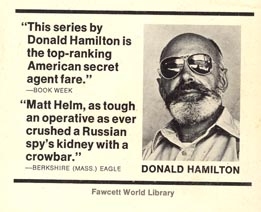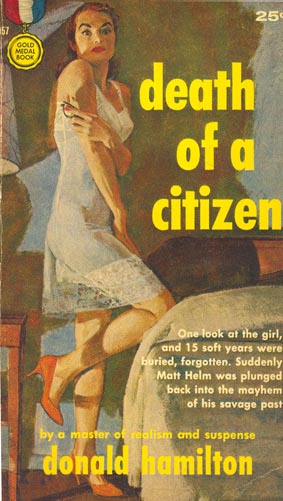 I just learned this week that Matt Helm creator Donald Hamilton died November 20, 2006, at the age of 90. I was surprised at how the news affected me, or I should say the degree to which it affected me. Although I only knew the man through his writings, the fact that he was still alive out there gave me a tangible connection with a bygone literary era which I love so much, that being the early years of the dime store paperback thriller. Now that he’s gone, along with so many writers who thrived in the 40s, 50s, and 60s, I feel like that fertile era of gritty fiction has slipped away for good.
I just learned this week that Matt Helm creator Donald Hamilton died November 20, 2006, at the age of 90. I was surprised at how the news affected me, or I should say the degree to which it affected me. Although I only knew the man through his writings, the fact that he was still alive out there gave me a tangible connection with a bygone literary era which I love so much, that being the early years of the dime store paperback thriller. Now that he’s gone, along with so many writers who thrived in the 40s, 50s, and 60s, I feel like that fertile era of gritty fiction has slipped away for good.
As I mentioned in an earlier post, I started reading the Matt Helm novels shortly after college. I had already read most of the James Bond novels and I was curious to see how the so-called “American James Bond” fared by comparison. What I found startled me. There really was no comparison. Matt Helm was a completely different animal, born from an entirely different style of writing.
My take on James Bond was that Ian Fleming took the essential elements of the old pulp magazine adventure stories (i.e., global sweep, fast-paced action, colorful villains, exotic love interests, etc.) and elevated the genre with sophisticated details about fine wines, the best restaurants and casinos around the world, proper customs, and frank sexual descriptions. For young men who had grown up reading pulp magazines, then experienced the world during WW II, the James Bond novels provided a comfortable blend of the adolescent and the adult for the post-war audience.
 Matt Helm’s world was rooted in the shadowy alleyways of the private eye novels. His character was more in keeping with the Sam Spade or Mike Hammer tradition. While James Bond would occasionally fret over the messy business he fell into, Matt Helm had no such worries. This was the Cold War, and there were plenty of commies and commie sympathizers out there who wanted to undermine our democratic way of life. Helm knew his job was to take these people out regardless of how dirty or underhanded his methods had to be. Bond would hold himself to certain rules of behavior like never shooting a man in the back; Helm would shoot a man anyway he could if the dirty bastard deserved it. In short, James Bond inhabited a fantasy world where the villains were polite enough to let themselves be caught; Matt Helm existed in a dark world where the bad guys would take you out without even introducing themselves, so you’d better be prepared to do the same.
Matt Helm’s world was rooted in the shadowy alleyways of the private eye novels. His character was more in keeping with the Sam Spade or Mike Hammer tradition. While James Bond would occasionally fret over the messy business he fell into, Matt Helm had no such worries. This was the Cold War, and there were plenty of commies and commie sympathizers out there who wanted to undermine our democratic way of life. Helm knew his job was to take these people out regardless of how dirty or underhanded his methods had to be. Bond would hold himself to certain rules of behavior like never shooting a man in the back; Helm would shoot a man anyway he could if the dirty bastard deserved it. In short, James Bond inhabited a fantasy world where the villains were polite enough to let themselves be caught; Matt Helm existed in a dark world where the bad guys would take you out without even introducing themselves, so you’d better be prepared to do the same.
Another element the Matt Helm novels shared with the hard-boiled detective genre was that they were written in first-person, allowing the reader an intimate look into the man’s psyche. In addition to understanding his approach to his job, we were treated to amusing ruminations on everything from Helm’s aversion to women wearing pants to his hatred of cheap gimmicks on American automobiles. Donald Hamilton was an ex-Navy man who also enjoyed many outdoor activities, so Matt Helm would provide lengthy monologues on manly topics like sailing, fishing, camping, and hunting. I suspect Mr. Hamilton used Matt Helm as a way to present many of his own opinions about the world around him. The result is a richly detailed character that seemed quite real and surprisingly likeable for an assassin.
While the Matt Helm books were my main exposure to Donald Hamilton’s work, he also wrote numerous novels and short stories, as well as nonfiction pieces on his outdoor interests. One of his better known Westerns is The Big Country, which was turned into a big-budget movie starring Gregory Peck and Charlton Heston. Recently, one of his old crime thrillers, Night Walker, was reprinted by Hard Case Crime. I can only hope that this new publisher, specializing in crime stories from the 40s and 50s, will choose to reprint more of Mr. Hamilton’s work.
I suppose it seems odd to feel such a tremendous loss over someone I never knew and who lived longer than most. For me, Donald Hamilton represented an era when average people read novels and fiction magazines as everyday entertainment. To feed that need for rich storytelling, a generation of terrific storytellers like Louis L´amour, Lawrence Block, Frank Gruber, and Donald Hamilton rose to the challenge and left a legacy of amazing fiction. The stories are still out there if you make the effort to find them, but the era is gone. With so many other entertainment distractions, reading has become an activity for the truly dedicated. Never again will we see such a diverse wealth of published material, created solely to entertain a mass market, devoid of the cynical marketing mentality so heavily plaguing today’s publishing world. I mourn the loss of a great writer, but I also mourn the loss of the era that spawned him.




No comments:
Post a Comment